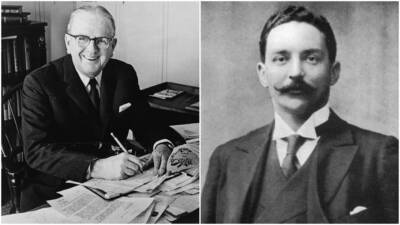Little-known letter from Norman Vincent Peale to the chairman of the White Star Line, which built the Titanic.
Hello, Mr. Ismay. Long night, I heard? You don’t know me, but my name is Norman and I’m a minister who’s been sent back in time to help you out. My sermons here in New York and my book called The Power of Positive Thinking became very popular with millions of Americans, so I clearly know what I’m talking about.

Despite — or should I say, because of — the book’s alleged “unverifiable sources” and how psychiatrists said it preached an unreflective and delusional mindset, it earned high praise from a president who was in the real estate business before making the slight transition to governing. A true story about him: hours after an event of a similar magnitude as this one — terrorists in planes knocked down two skyscrapers here in the city — he boasted (incorrectly, they say) that one of his buildings had just become the tallest in Manhattan. That, my friend, is exactly the kind of attitude you need right now.
So here’s where we stand: about 1,500 casualties, and the papers are calling this the worst peacetime shipping disaster in the Western hemisphere. But that’s only partly right. Yes, it was deadly, we can’t argue that. But a disaster? A tragedy? Please. Even if it’s true that you, chairman and managing director of the company that built Titanic, pressured the captain to make record time through waters known to have icebergs all for some good publicity, that’s no reason to get down in the dumps. Trust me, there are some good things we can salvage from the wreck (so to speak) if we just look on the bright side.
Speaking of illumination, we know how artificial light affects our ability to see the most well-known constellations in the night sky: the Big Dipper, the Little Dipper, My Own Initials, and so on. As Titanic sank, the electricity went out, which made the celestial bodies above shine spectacularly on such a clear night. How fitting, then, since the ship was the crown jewel of the White Star Line. We can only attempt to live up to our names as righteously as that.
Secondly, you have to admit the irony in Titanic’s rapid pace causing passengers to arrive here much later than had the ship traveled at a more moderate speed. But for those like yourself who have important business engagements in the city (the important people), this is a blessing in disguise. It’s going to force the other parties to work around your schedule, which automatically puts them in a deferential position. Also — I see that chipped nail of yours — what you endured will make them more sympathetic to your situation, so if any negotiations occur, they’ll be less likely to play hardball. Your checkbook will thank you.
Another point about your class: I just heard from a very reliable man on the street over there that despite the ship’s exquisite accommodations and services, the kitchen was running dangerously low on ice, believe it or not. (Rumor has it several ladies requested bags of it after interacting with a passenger with the last name ‘Dawson.’) When the iceberg was struck, however, pieces of it fell onto the poop deck, which was actually quite clean. This meant the likes of John Jacob Astor and Benjamin Guggenheim could rest easy knowing their champagne and salad forks would remain at the proper temperature for the duration of their travel. Their next of kin can take solace in that, and also their wills.
The iceberg’s size being reduced not only benefited passengers like yourself, but it will help all future travelers on the North Atlantic. That area is a popular route for a variety of ships, not just luxury passenger liners. In fact, a highly distinguished authority on the matter—he was wearing glasses, after all—told me that anywhere from 300 to 500 vessels go to and fro not every fortnight, not every week, but every single day, if you can imagine. Would I be wrong to say Titanic took one for the team by making such a large object that much more manageable? I don’t think so.
Now I’m a glass-entirely-full type of person, but even I know hitting icebergs isn’t a long-term solution for improving travel. So this is how I see things going from here. You and the other titans of industry will realize that pumping carbon dioxide into the atmosphere will melt a lot of sea ice, and this will cut down on the number of hazards in shipping lanes. This means more coal-powered ships, more of those Ford automobiles, more oil drilling, more factories with a high child-to-fire extinguisher ratio — whatever it takes. This will make the economy soar, trust me. Just don’t hold onto all your stocks for too long, though, but we can talk about that later.
So cheer up. That route was like an obstacle course, and I respect any man who’s up for a good challenge. The problem was the lookouts probably didn’t visualize the way around the iceberg hard enough. In any event, we’re glad you made it off there safe and sound. In the next few weeks, you’ll receive a generous amount of publicity alright, most of it very slanted, of course. But at least you’re being talked about, you know? Plus, you’ll even get to go testify before Congress. What better chance to do some schmoozing?
- Tucker Carlson Exposes More Media Lies - March 14, 2023
- Obsessive-Compulsive Santa Is Checking His List Twice…Then Three More Times, Plus Once More After That (Just To Be Sure) - December 20, 2021
- This Isn’t a Haunted House… It’s a Haunted Home! - October 27, 2021

